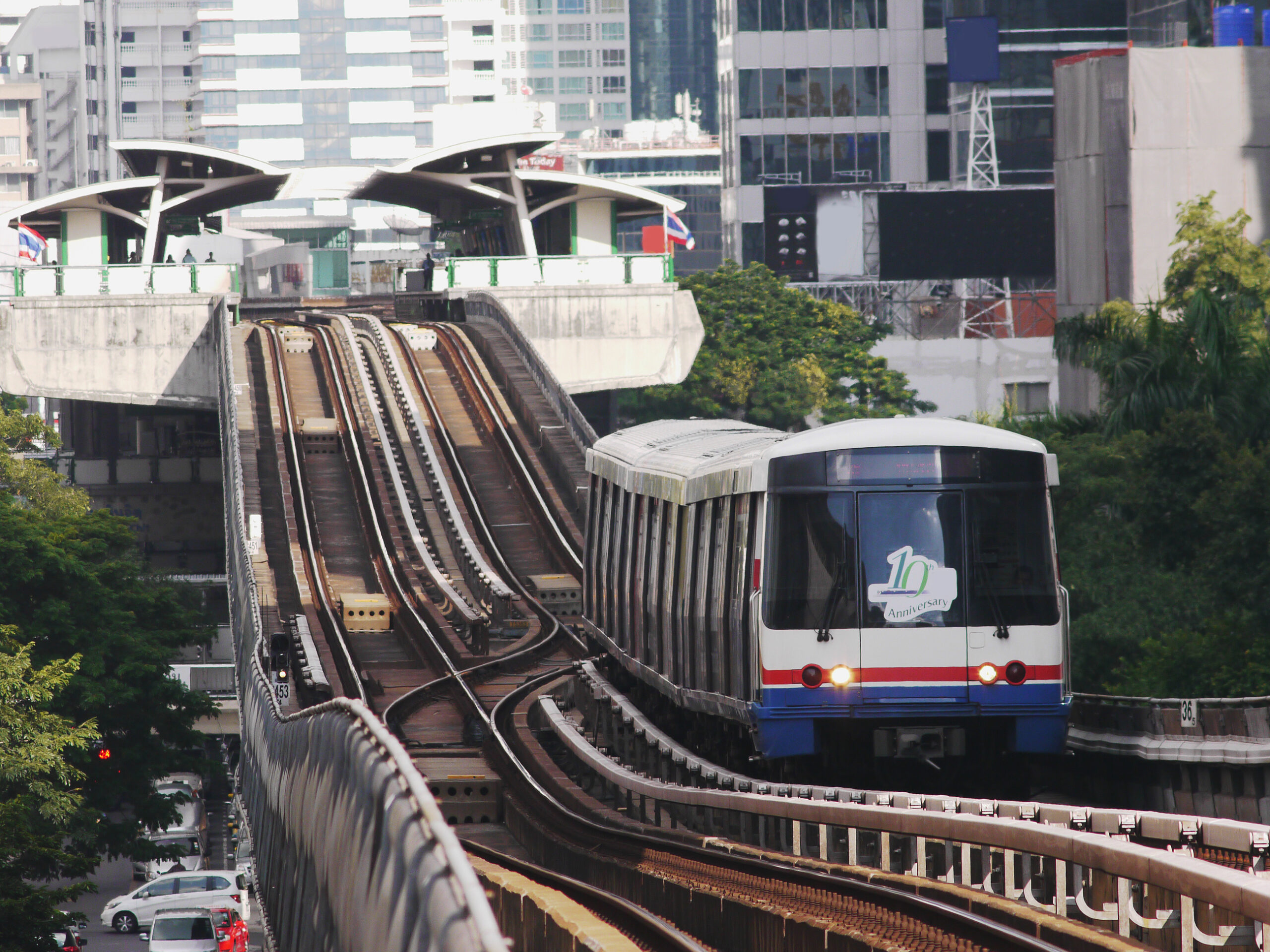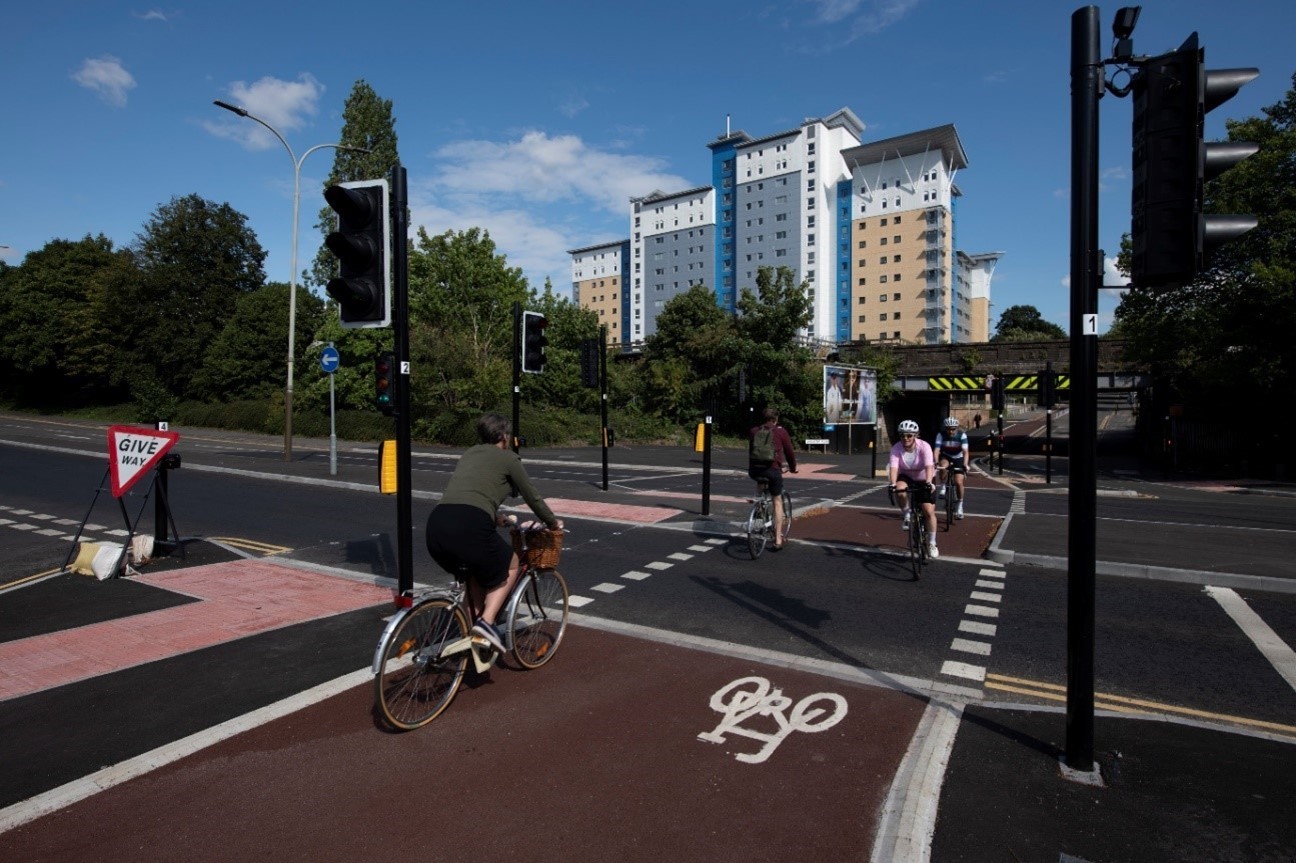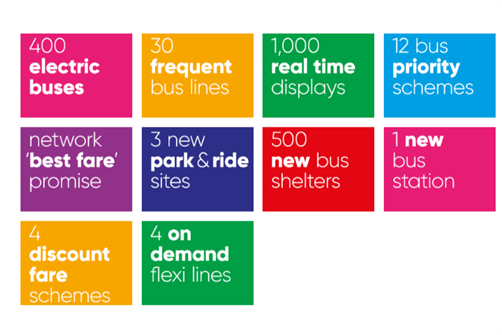Posted By:
Matthew Ahluwalia
Programme Officer

This investment forms part of the 50-point Climate Action Plan for Councils under Action 21, to prioritise transport investment in cycling, walking and public transport, with a priority of installing segregated cycleways on most roads, increasing space for pedestrians, and introducing a 20 mph speed limit in urban areas.
Leicester is one of the UK’s 5 fastest-growing cities, and transport is the largest source of climate change emissions. Cutting emissions from transport will be key to the council’s ability to meet its ambition of becoming carbon neutral by 2030. The council has successfully secured funding of £70 million through the government’s Transforming Cities Fund to transform the provision of walking, cycling and public transport across the city. The programme aims to double cycling rates and boost bus journeys by 10%. Measures include new ticket technology, an express electric bus network, new bus lanes and walking and cycling routes.
The city’s transport policies are part of the Connecting Leicester programme, which is designed to make active travel more attractive to local people while reducing the dominance of roads in the city centre.
Projects included as part of the Transforming Cities programme include:

Leicester’s bus ambitions have coalesced into the Big Bus Plan, with a vision of 30 bus lines, serviced by 400 electric buses, that are green, frequent, reliable, easy to use and great value. To make this vision a reality, in 2022 an Enhanced Partnership between the city council and the 5 major private bus operators was formed. Bringing the operators together was crucial, as no single company dominates Leicester’s bus services. Co-operation is therefore the only way to deliver travel routes that are cross-city and efficient (requiring few changes). By May 2023, within just a year of starting, the partnership had delivered many improvements:

The Enhanced Partnership’s early success indicates it could be a blueprint for other cities.
Councillor Adam Clarke, Deputy Mayor of Leicester
Dawn Badminton-Capps, Chair of Leicester Bus Partnership Forum
Meanwhile, the £14.3 million St Margaret’s station is the first net-zero-carbon bus station building in the UK, with 390 solar panels on its roof, and was celebrated with a win at the 2022 Future Cities Forum Awards.
By the end of 2023, the council plans to deliver an additional 16 km of new, safe cycle routes as well as improving existing ones, for instance widening the popular Great Central Way footpath. To increase the impact of the new transport policies, Leicester City Council has designed these measures to create corridors that strategically link the city centre, regeneration areas and business parks with employment hubs and where housing expansion is planned.
Leicester’s active travel leadership has been recognised at the highest levels. In its very first government review of active travel infrastructure in 2023, Active Travel England ranked Leicester as one of only 5 local authorities to achieve the top performance rating.
Councillor Adam Clarke, Deputy Mayor of Leicester
The council is using money from the government’s Transforming Cities Fund to decarbonise transport in the region. The investment is already delivering rewards.
For example, the council’s integration of contactless payment methods across public transport systems brings the value-for-money benefit of £3.63 for every £1 invested through journey time savings, increased patronage and reduced operating costs. Prioritising investment here will save 442,549 hours in journey times per year for existing travellers through faster onboarding processes.
Leicester City Council has committed to this project because council leaders recognised the far-reaching economic opportunities that investment in active travel and public transport offers, through making the city more attractive to visitors, shoppers, businesses and investors.
Anticipated economic benefits include reduced congestion due to a shift from the use of private vehicles to sustainable modes of travel, as well as reduced delays to bus passengers.
Anticipated health benefits are another clear driver of the project. Higher levels of exercise are expected to boost local people’s health and reduce mortality rates, while also reducing absenteeism in the city’s workforce. Overall, the council estimates a benefit-cost ratio, with every £1 invested expected to create £2.84 in wider benefits related to health and wellbeing.
Motivated bus operators who’ve been willing to work together but also compromise have been key. Increasing ridership is to the benefit of all operators involved.
Investment for this project came from 2 injections of funding from the Department for Transport’s Transforming Cities Fund. The first, in 2019, awarded £7.8 million for the council to create active travel schemes and to electrify park and ride services.
In 2020, a second injection of £32.5 million was awarded, based on a strategic business case outline created by the council to cut carbon, improve health and bring significant economic benefits to the area.
In addition to this, Leicester successfully won a further £30 million from the department’s Zero Emission Bus Regional Areas (ZEBRA) scheme towards a £60 million programme to purchase zero-emission buses.
Active travel funding was secured in 2023 when the council was awarded £400,000 from Active Travel England’s Capability Fund. The fund aims to create a skilled active travel workforce and to make options like walking and cycling more accessible for as many people as possible.
Wide-reaching community engagement is important in making new sustainable travel measures a success. An important lesson from Leicester’s work has been to use pop-up travel measures such as cycle lanes to win over the public, who can then experience first-hand the benefits change can bring.
The authority has also worked with external organisations to create a broader cycling culture across the local area. It’s joined forces with partners such as Sustrans, British Cycling and Living Streets to deliver important engagement initiatives. These include the £300 bike challenge, a fund for city-based groups to promote a cycling culture more widely.
Open Streets is a monthly event bringing communities together for walks, guided tours, bike try-outs, art and entertainment around the city’s streets. Open Streets has helped to connect local residents and improve cycling safety, alongside the annual Walk Leicester and Ride Leicester festivals.
Strong political leadership was essential to Leicester’s approach, ensuring that there was a commitment to the significant planning and engagement that was needed.
Political leaders and officers throughout the council must really buy into the project and back its implementation, to enable the significant benefits to be realised. Leicester has benefited from the resolutely pro-bus stance of several key councillors.
Councillor Adam Clarke, Deputy City Mayor
In 2019 Leicester’s Labour council made a commitment to consult on a workplace parking levy, a fundraising mechanism that investigated the potential to charge employers with more than 10 parking spaces, with the money ringfenced for public transport improvements. A workplace parking levy can boost business by easing congestion, improve air quality and improve transport for residents who don’t have cars, as has been demonstrated in Nottingham. However, in November 2022 Leicester decided not to go ahead with the levy due to the current national cost-of-living crisis.
The Campaign Against Leicester’s Workplace Parking Levy brought together unions, some community groups and residents in a visible, well-organised campaign, which included film screenings, door-knocking, local radio appearances and mass leafleting at sites like the King Power football stadium and Leicester Royal Infirmary. Although campaigners agreed with the need to take climate action, they opposed the possibility of workers being charged an extra £550 annually during a cost-of-living crisis without an immediate improvement in the usability of local buses as an alternative travel option.
Climate Action Leicester and Leicestershire, a group which campaigned in support of the levy, also echoed the need to put social justice at the forefront of fighting the climate crisis. Workplace parking levies can be a tool to address inequality, especially for those who can’t afford a car like a third of households in Leicester, and for those suffering from poor health due to poor air quality. Leicester has statutory obligations to reduce air pollution and, while the city became fully compliant with EU air quality standards in 2020, partially due to the COVID-19 lockdowns, a parking levy would have helped to maintain this. Although Leicester decided against the levy, other councils can learn from the campaign in Leicester and design their levies to address residents’ concerns. For example, Nottingham made healthcare workers exempt from its workplace parking levy. Levy charges could be adjusted to income levels, or people on low incomes could be exempt until buses are improved.
Other cities will be in a similar situation. See some top tips for developing a successful levy that engages the community and addresses equity issues.
Leicester experienced a number of unforeseen circumstances in the development of its proposed workplace parking levy. This included COVID-19, the cost-of-living crisis, and national and local economic challenges, which made it difficult to progress the levy. However, a number of reflections can be drawn from the process to assist other local authorities considering a levy. These include:
Although Leicester has had several successful bids, the patchwork nature of central government funding means it has no consistent revenue stream to finance all of its transport commitments. In April 2022 Leicester missed out on £41 million from government under the Bus Service Improvement Plan scheme. The council was also frustrated by the lack of constructive feedback from the Department for Transport on why Leicester was unsuccessful.
In the absence of reliable funding from national government and without a workplace parking levy to generate its own money, Deputy City Mayor Councillor Adam Clarke has warned it’s possible that Leicester won’t have the funding necessary to fulfil its radical ambitions . Ideally, multi-year capital funding would transform the landscape of public transport in the UK, encouraging private operators to invest long-term and dramatically improve bus ridership.
-Paresh Patel, Unite Union regional secretary
Find more guidance for local authorities on our Learning Out Loud pages.
Leicester City Council has made an impressive investment in public transport, walking and cycling, understanding the economic and health benefits this’ll bring alongside cutting carbon emissions. It’s really important that, where councils have put in pop-up cycle and walking routes, these are transformed into high-quality segregated and permanent routes.
It’s disappointing that the council felt unable to introduce a parking levy, and it should reconsider this in the future. Meanwhile other councils can learn from Leicester’s experience. Councils should ensure that they design parking levies to be fair on lower-income workers. When parking levy fees are invested in public transport, they help residents with low incomes who can’t afford to own a car.
It’s also essential that the government makes sufficient, stable, long-term funding available to decarbonise transport in towns, cities and rural areas across the UK. The failure to grant Leicester the money it needed for its Bus Service Improvement Plan to build on the work done so far makes no sense given the multiple benefits it would’ve delivered and highlights the challenges facing councils having to compete with each other for grant funding.
Friends of the Earth is showcasing specific examples of good practice in tackling climate change, but that doesn’t mean we endorse everything that a council is doing.
This case study was produced by Ashden and Friends of the Earth. It was originally published in March 2022 and was last updated in September 2023.
T: 0207 4100330 E: info@ashden.org
The Peak, 3rd Floor 5 Wilton Road, London, SW1V 1AP
Registered in England and Wales as a company limited by guarantee.
Registered number: 05062574/ Charity number: 1104153
See our privacy policy.
This site uses cookies to provide you with the best user experience. By using the Ashden website, you accept our use of cookies.
Stay up to date